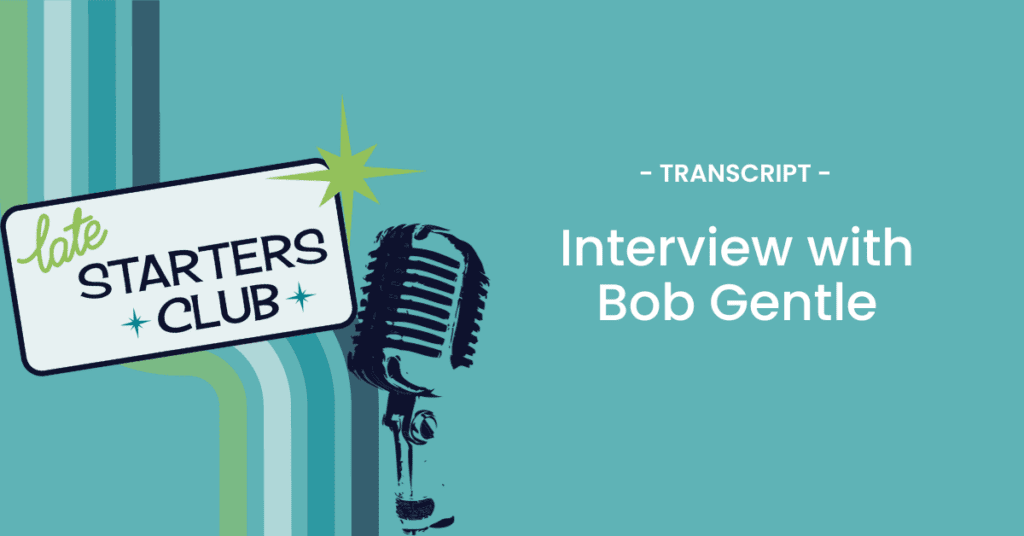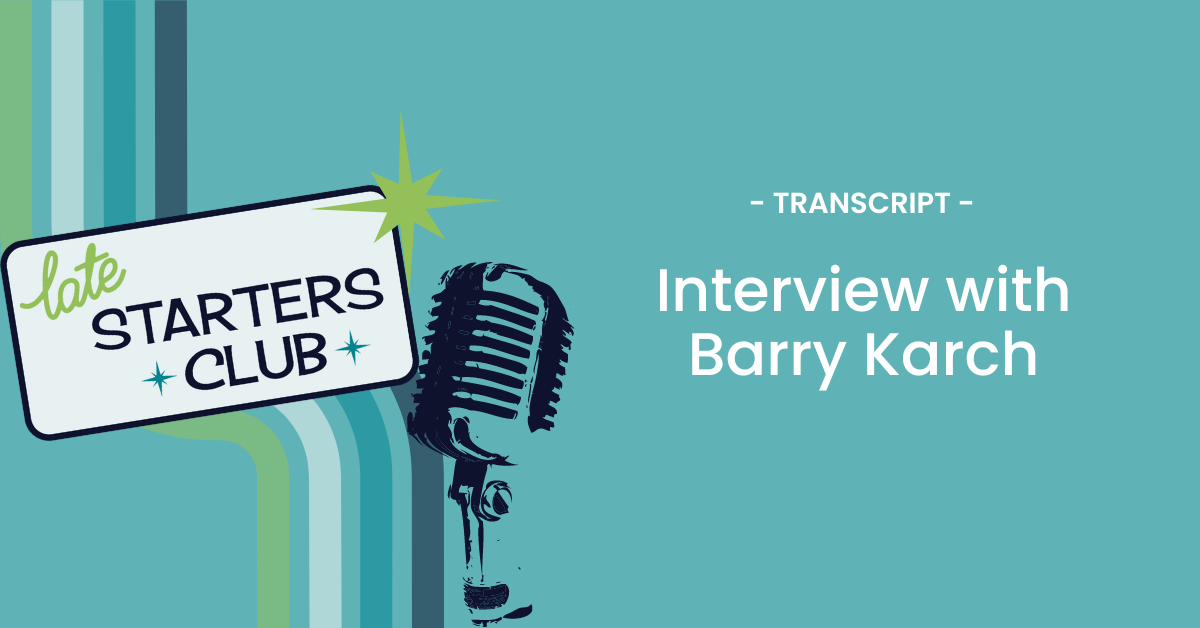Subscribe Apple | Google | Spotify | Stitcher | iHeart Living the Dream Overseas with Christine Gritmon Have you had a lifelong dream to live overseas and haven't made that happen yet? Maybe things have gotten in the way like family, jobs, life. My...
Ep160 Transcript: Interview with Bob Gentle

Andrea Vahl: What does it look like to bet on yourself? In today’s episode, I talked to Bob Gentle, who went from a local business to a global coaching business, pivoting into something he did not know that much about and we also talk about some of the challenges he had to overcome as a natural introvert on a global stage. Tune in.
Hello, dreamers. Welcome to the late starters club, giving you the inspiration, mindset, and tools you need to start something midlife and beyond remember, it’s never too late to follow your dreams.
Hello, late starters. It’s your host, Andrea Vahl.
And I am here with the amazing Bob Gentle, who I have, I have had the pleasure of meeting several times at Social Media Marketing World. And have we met? Have we met? at other conferences? I always get confused.
Bob Gentle: I don’t think so because I’m in Scotland.
I really am judicious with my travel. So yeah. And you’ve also been on my podcast once. At least once.
Andrea Vahl: Yes, that’s of course. Yes. And it’s just really a good reminder for me that I should come to Scotland.
So, so, Bob is a, I’m just going to share your, your bio. Cause I love this bio too. Bob helps business leaders around the world to discover, set and achieve goals online and build a business they love.
So that. That is just, I mean, who doesn’t want a business they love. Right. And I think there’s a lot of people who who are in a business they don’t love or in a job they don’t love. So you probably have plenty of work to do.
Bob Gentle: Yeah. No, that’s absolutely true. I think so many people are, they may be making a living, but there’s not much joy in it. And that just makes me so sad.
Andrea Vahl: Mm hmm. Mm hmm. Yeah. Yeah. And you also have a podcast. Remind me the personal brand business roadmap is the, or is that the podcast?
Bob Gentle: Podcast is the personal brand business show.
Andrea Vahl: Oh yeah. Personal brand business show. Yes. Yes.
So, I love that too, because creating a personal brand is huge. And I think it’s something that there’s even more and more discussion around, I think lately, I don’t know, maybe I’m just seeing it more, but I I’ve just been hearing it.
More and more on people’s minds and even people who are at companies doing that kind of thing.
Bob Gentle: I think the thing with a personal brand is everybody has one. It’s just how intentional are you about cultivating it and how intentional are you about amplifying it? And really, for me, that’s half of what I do.
And the other half is how are you monetizing that? Because its all well and good to be famous, but if you can’t send anyone a bill, then whats it for?
Andrea Vahl: Right, right. Exactly. Exactly. A lot of followers are not Not paying your mortgage with followers, right?
Bob Gentle: Likes ain’t cash.
Andrea Vahl: That’s right.
So, so we’re going to dive into your late starter story, which I just absolutely love. And I am so excited because I think that so many people are going to be able to relate to this.
Because it’s really a universal thing that can happen.
So first of all, I want to just. Share Bob was saying, Hey, I want to guest on, on some podcasts. I was like, Hey, come on mine. And, and you were thinking about what your late starter story was and, and realized you have a pretty powerful one.
So share with our listeners what your late starter story is.
Bob Gentle: Well, I was super brief when we were speaking, but I’m going to go right back to when I was in school. I was a naughty boy, but I was always the quiet one that never got in trouble because everybody else got caught. And I really struggled with vocation.
When I was in school, I really couldn’t see anything in the world that I wanted to do. I thought, well, Pirates are all gone. You can’t be a gentleman adventurer unless you’re financially independent. I can’t be a space Ninja. What are all these other things people do? And I just thought this looks so boring.
And for the longest time, I was really frustrated with life because the idea of getting up to go to work, to make a living, to come home, to live, it’s just this vicious cycle of monotony. I just couldn’t see what that was for. And I fell into working in the creative industries by default, the family businesses software, I was profoundly dyscalculic.
So I’m not very numerically competent. I’ll put it that way. As a programmer that’s a real weakness. I make a joke about numbers, but it’s really about structure and organization and software is structured in organization. So that wasn’t gonna work for me. And when the internet came along, I finally.
Felt at home, we have web design. I can do this all day long. It’s so easy. It was a good creative outlet and I have it a little bit of a developer’s mindset. So I know how to build things like that. And for most of my twenties and thirties, that’s what I did. And very quickly it became monotonous. To some people, it looks like a glamorous life running an agency, which I did build a good size agency.
But if anybody’s ever run a creative agency, you’ll know it’s not super profitable. You can look like you’re playing a good game, but you’re not really making any money most of the time. And I was the biggest in town and the city that I lived in couldn’t really support anything much bigger. So I was frustrated for a very long time and I tried to fix this business in so many ways and nothing seemed to work.
And then one day I was having coffee with a client and it essentially turned into a coaching session and he said to me, you know what, you’re wasting your time with this business you’re in, this is what you should be doing. And he was a very wealthy guy, very sharp, and I realized, you know what, this is probably the most fun I’ve had for years, this one conversation.
Now, when I talk about coaching, it’s really with an emphasis around personal visibility, personal branding, that’s where I naturally go. I want people to shine. I want people to really step into their full potential and very quickly within a matter of two years, I completely pivoted the business so that that’s mostly what I was doing was a hybrid digital marketing, personal brand strategy. Part coaching because a lot of the things you need to do to build a personal brand that can be emotionally challenging and then partly technical support. It was the perfect blend for me personally and I’ve never looked back.
For me, that’s gone from being a very insular, locally well known business to, I don’t even live in that city anymore where I was completely dependent on my local business community, completely untethered myself from that. Now my clients are all over the world. I have more clients coming from the Pacific coast of the U S than I do from the whole of the UK.
And that whole transition has really happened only in the last four years, really, since I started my podcast. And that entire change started when I was really 48, which is very late for a complete business transformation, I think.
Andrea Vahl: Yeah. Yeah. Yeah, for sure. And that had to take a lot of courage to really pivot like that.
I mean, to really jump in and really, just from that one conversation to say, I’m going to bet big on this, on, on this.
Bob Gentle: I think for me, that was the hardest thing because I have always been really introverted. I mean, I’m, I’m not. When I first started my business, I remember going to my first networking event and I stood outside shaking.
I was terrified of what this was going to be and at every stage trying to be more visible. It’s been terrifying and finding new ways to overcome that. I remember I was at a mastermind session at a conference in London and I remember telling people. That I was terrified of the very idea of posting a selfie.
Now, if you see me on social media now, I’m Mr. Selfie. That was not easy. Yeah. And I remember thinking to myself, and if I’m monologuing, just hold up your hand and tell me to stop.
Andrea Vahl: No, I love it.
Bob Gentle: When I was. For most of my twenties and I think it was about 18 years, I worked as a volunteer in search and rescue and I ran quite a large search and rescue team where I lived at that time in Scotland and we were very busy and I remember sitting in this mastermind session thinking you’re happy to jump out of helicopters.
In the middle of the night, you’re happy to abseil down cliffs in raging storms, and you’re scared of a selfie. What’s going on here? And I thought, yeah, how do we train people to do scary things? And it’s a gradual process of desensitization. So being very mindful of that, I’ve been kind to myself as I’m growing into being more visible.
But. Fear shrinks in the light. So every time you’re experiencing fear, just really examining it and thinking, well, what is it? So you call it courage. For me, it’s just simply examining what are the things that you’re scared of becoming super conscious of them, getting really granular and thinking specifically, what am I scared of?
And then when you do that, moving past, it’s actually quite straightforward.
Andrea Vahl: I love that. I love that. There’s just so many things that you said that I just want to explore a little bit because I think it’s just huge for people to think about their fear and examining their fear in a different way. Cause just this week I was, I was posting, I was doing some short.
And I was like, I was terrified and people think, Oh, Andrea, you’re so confident you’re an extrovert. And I was like, it was killing me to post these things. And it’s funny what things come up. And, and I love that whole idea of just gradual desensitization to that fear.
And that’s a way to progress, right? We can say, okay, I’m just going to do a little bit. I’m just going to do a little bit.
Bob Gentle: I think as well alongside that, when we are with our families or with our natural organic peer groups, what we’re doing as business owners, particularly online business owners is really unusual.
It’s super weird. And so there’s so many reasons not to do it. So finding new peer groups. That will help you normalize the strange behavior is really important as well. I think that’s why we go to these conferences where we met, because that’s where our weirdos hang out.
But as it gives you a supportive peer group, it renormalizes strange behavior. And you see this, you wonder why the Hollywood celebrities all hang out together is because those are the only groups where they can be normal and feel normal. And. You see that in any, any tribe where strange behavior is important for success, just around themselves with other people for whom that’s normal.
So anybody listening, thinking you couldn’t do these things when you’re in an environment and in a community where these things are normal it’s much, much easier.
Andrea Vahl: Yeah. Yeah. It feels like home. For sure. It feels like home. And it, and it’s funny because I went to a different conference and I was in, I go to, social media conferences and marketing conferences and went to a different type of conference.
And the first thing that was really You know, jarring for me is I was noticing that no one was taking selfies. I was like, what? What? What’s going on here? No one . So I like going where the weirdos are . So the other thing you said, Bob, that I, and I wanna explore a little bit more and, and unpack because I think you’re so good at it, is just really.
Taking this idea of the introvert and talking about how you become a content creator and putting yourself out there in such a big way that may feel so much more uncomfortable for you. What do you do in those situations or what has led you to becoming such a content creator out there in the world? And do you like it? Obviously, you probably, hopefully like it, but…
Bob Gentle: I think for me, the one thing with being a content creator is when you are the consumer, you see a content creator and you think, wow, they must just be so outgoing and extrovert. But the truth is, as a content creator, the delightful thing is I can take a time and I can think about what I’m going to say.
Because if you meet me one to one, I fall over my words, I struggle to articulate myself, there are more dominant characters around and I’m going to shrink back. But when I have a camera or I have a microphone, I can plan what I’m going to say a little bit. And like any good content creator, I know my topic.
So my talking points, I’ve mostly got them locked in. I used to worry that I repeat myself a lot. I talk about the same things again and again and again. But you look at any… Great content creator, they’re doing that repetition. If you want to be known for something, repetition is foundational. You have to be repetitive.
So that used to bother me a little bit. As an introvert, I think you have some advantages of content creator because you can perhaps be a little more thoughtful. I guess that’s possible. I don’t want to insult extroverts. But I think what’s important is for people to understand that being an introvert and being shy are not the same thing.
Introvert is a personality type. You’re not going to change that. You need to just understand how to work with it. Whereas being shy, that’s more of an experience question and you can reduce shyness with experience. And the only way to do that is repeatedly exposing yourself to the things that are situations where you’d normally be shy.
As a kid, I was. Profoundly shy. I wouldn’t talk to anybody. And the person that you meet now is very different to the person I was 20 years ago. I think a lot of people will use being an introvert as an excuse for not doing content. And. This being the late starters club, whenever I hear the word I’m too old to, or it’s too late to, it really gets my back up.
I only learned this…
Andrea Vahl: That’s why I started this whole thing. I couldn’t take it.
Bob Gentle: I learned to snowboard at 45. I’m a really good snowboarder now. I’m better than most 25 year olds. I honestly, the things I think about starting just now. I have to worry if I’m physically capable of them sometimes, but there are so many, I think here’s the thing I’m going way off topic here and I’m sorry.
Andrea Vahl: It’s all good. It’s all good. I love anywhere we dive into.
Bob Gentle: As older people. And I honestly, I rarely even think about my age. It’s really important to look for role models because we’re exposed with young. Beautiful 20 somethings all the time and the incredible older people who are doing things we don’t see so readily because of the glamour around the 20 somethings, but there are so many people doing wonderful things later in life that there’s just so much potential.
I mean, my whole life has changed. I’ve completely replaced my income streams and I don’t live in the same city. I’ve gone from being a pokey wee local business to a completely international business in only four years. And I’m no Einstein I promise you if I can do this, literally anybody can do it.
Andrea Vahl: That’s that’s awesome. I love that message. I love, I, I’m so, I’m so on board with all of that because I think it is I think it’s a really exciting, unique time that we have where we have so much experience and perspective on life and the way things go and how we actually get things done that we can do things a lot faster than the 20 something.
Sometimes we’ve got resilience, we’ve got experience, we’ve got, a network of people that can rise up to help us. It’s just. Beautiful.
Bob Gentle: I think there’s another thing I want to mention here, which is with all those advantages of being older that you just outlined, there’s one disadvantage as you grow older, which is as we grow older, there’s a tendency to harden our mindset, to become more rigid in our thinking and also think I’ll put this differently.
I think vanity becomes a bigger issue as you grow older, worrying about what people think about you. And being less willing to take risks with that. And that holds a lot of people back. They’re not willing to risk their identity.
Andrea Vahl: Well, I think the other thing too is that sometimes we, we’ve built ourselves into a lifestyle as well we might have families, we have responsibilities, we have a larger mortgage than you might’ve had when you were 20 and, sharing an apartment with someone.
So there is a little bit of worry about, financial risk and can you really, leap into something totally new. But on the flip side is that it can be wildly successful and profitable when you’re following something that you’re so much more passionate about as you have found.
Bob Gentle: I think that’s an important point that sometimes people think a little is a bit of a paradox that they think a little too big.
Maybe I’m going to say they think more complex.
But they, but they don’t think big enough. As when people look at very profitable businesses from the outside, they assume that it must be complex. There must be lots of moving parts. I’ve spent my whole life working with business owners. And what’s interesting is that People who seem to make the most money have the simplest businesses, hardly any moving parts, tiny little teams.
The most profitable business owner I ever met was a guy who had one product. He made a little comb. When the kids get knits or lice in their hair, he made 50 percent of those in the world. The combs for that. Really simple business. He made one thing. He never touched the thing. He had just got a guy in China who made them and he sold them to the stores.
That’s all he did. Incredibly wealthy guy. Most of, yeah, most of the really successful people I know their businesses are tiny. So it doesn’t need to be complex. Think simple, not complex, and what that allows is you can build this on the side very productively because it doesn’t have to be time consuming.
Andrea Vahl: Yeah. Yeah. And I think that’s a, another really great message as well. Just, start. Start with, start somewhere, start, start just chipping away at it. You don’t have to quit your job and, go all in or whatever. You can pivot things like that. So that’s great. And it’s making me think that maybe I should go into the comb business.
I don’t know. That sounds
so awesome.
So, so during this, during this Four year kind of transition you had, well, I don’t know if it was four years, it was four years ago, but during this transition time where you were pivoting, was there a point where you were overwhelmed or doubting the, where you were going and had a, dark night of the soul moment that you had to get through and we’re overwhelmed with. And if so, how did you get through that?
Bob Gentle: I think overwhelm for any business owner is a constant companion. It never goes away. What I think makes the difference is when you have strategies for coping with it, knowing that it’s inevitable, a real key to success is being able to spot it really quickly and having a strategy to deal with it.
So. For me now, overwhelm probably kicks in once a month and I know what to do. For me, strategy number one is I don’t store anything in my head. Everything goes into a task management system and a database. So I externalize everything. And what that means is I don’t have to expend energy storing it in my head.
So when I start to experience overwhelm, I know now what to do. I need to go back and I need to review everything I’m committed to and isolate those things which are actually important and those important things are going to fall into two categories. Things that are on fire and things that are going to move me forward and they’re usually not the same.
So I need to look at those things that are on fire and see them for what they are. There’s probably small, small potatoes. They’re just on fire. Put those fires out really quickly and easily. And then the feeling of overwhelm is often, I’m not feeling like I’m moving forward the way that I should. So identifying those things are actually important to moving yourself forward rather than simply they seem urgent, separating the urgent from the actually important.
And once you’ve done that, The overwhelm kind of dissipates and you can execute on those things and realize you probably weren’t as overwhelmed as you thought you were. It’s like everything else. When you shine a light on it and you break it down into little bites, everything is easy. Just start nibbling away.
Andrea Vahl: Yeah, yeah, for sure. For sure. It is. It’s definitely and it can be like so many external things that contribute to this, if you don’t get enough sleep and you’re stressed out, like you can, sometimes when I’ve felt the most calm, I’ve had the longest to do list, and other times I, I’m freaking out and I.
Feels like I can’t get anything done. I just have four things on my list. So it, it’s just always so many, so many different factors that go into it. And I like what you said that we’re always in a state of overwhelm. And if you realize that and, accept that for a, what it is and just don’t get bothered or, just know that it’s.
Just always going to be there as a feeling, then you can maybe relax into it. I don’t know.
Bob Gentle: For me, that’s the thing is for me. I think I’m, I’m very lucky in that I genuinely love what I do and wondered about this for a while thinking I’m a workaholic. I’ve realized this. I get stressed when I have to go on vacation and I, if, when I go to a conference and I’m away from my desk, I get palpitations because I really liked being at my desk and plowing through the work. And I’d become okay with that. I used to think that was a problem, but actually for me, it’s healthy because I genuinely love my work. It’s not, it doesn’t feel like work. Yeah. And once I understood that it was far easier to relax into the work as you said there. So for me, overwhelm. Is more of an issue when I’m not able to do the work.
Andrea Vahl: Yeah, yeah. No, I I’m I as another workaholic. I I definitely I hear you. I feel that same way. I wanted to ask you, since you have an interesting perspective about where you’re at now versus where you started, I’d love to hear, one of the questions I sometimes ask is if you could go back and tell your younger self something what would you tell your younger self?
Bob Gentle: I would tell myself. That I mentioned this earlier, the most successful people I know focus on simplicity. They focus on less, not more. So I would go back and tell myself, just pick one thing and really commit to it and bet on yourself. Be the one guy that everyone in the world knows for this one thing.
This is essentially what I do now, but I would wish I would have started much, much earlier. I, I wish I’d seen the painting on the wall, look around all the other businesses that were doing what I was doing and thinking, well, I’ll be the one guy who can turn this into an amazing business. Nobody ever did.
It should have been so obvious. If, if nobody else in your industry is getting rich, why are you the exception?
Andrea Vahl: Mm hmm. Mm hmm. Yeah, it can be, we can, it’s hard because we can choose something that’s not, that’s, that, seems like we just fall into it. But I think the thing is, you don’t, it doesn’t matter getting rich or not getting rich.
If it’s bringing you joy, and you’re loving it, then that’s okay.
Bob Gentle: It doesn’t matter. This is again. Another important thing that I want to mention is motivation. People are motivated by such different things. Some people are motivated by impact. Some people are motivated by money and some people are motivated by what would you call it? Mission.
And for most people, it’s a bit of a blend of the three. I have a friend who runs a marketing agency and he just works with mortgage brokers. I would die if that was my business, finding something that you can do in the world that is positive and brings joy is so liberating. And that’s why I like my work so much, but it’s hard for most people to do that.
But never give up on it because you can get railroaded into a role in life and you think that’s it. This is my lot. Now, it doesn’t have to be a lot of people are unhappy with where they are, but. If you, that might be you keep your head up and look around for what could that thing be. And once you spot it, start the baby steps because the baby steps keep going.
You will arrive somewhere. You didn’t think you could probably listening now thinking, well, I couldn’t. I promise you, you could.
Andrea Vahl: Yeah. And it, and it, all it takes is really just dipping your toe in it. And, and starting, starting the learning process and say, is this for me? Because sometimes what looks like something great on the outside maybe isn’t as great on the inside.
And so it’s always important to just experiment with it and see how it feels and see what, learn from other people who are doing it. And there’s, there’s so much possibility out there now. We live in amazing time. I mean, really you can do anything. People are making a living in the craziest ways.
So it’s all
Bob Gentle: possible. So I remember joking with a client once I said, if I, if I could give you a time machine and you could go to any future you want, you can pick where would it be? And he came up with some, some great ideas. But the reason I asked him was. In the moment I’d had this idea, okay, well, let’s just imagine we could build a time machine.
And then I realized, you know what? I think I was in the shower when I had this idea. We could build a time machine and here’s how we would build it. It starts with fantasy and then it comes a little bit more concrete. And then the second component is a dream. And then the next component. Is a goal and then the next component we’re going to put in is some projects to support that goal.
And the next component is the tasks to support that project. Now we have a time machine, we can go wherever we want. And I thought that’s a such a nice picture and anybody can build a time machine. Those are the five components.
Andrea Vahl: I love it. I love it. I got chills. Oh, so good. So good. So we the half hour always goes so quickly, but I want to it’s just such a fun discussion, but I want to close out with one of my favorite parts of this interview of these interviews is finding out people’s favorite quote or inspirational saying that.
Really motivates them and brings them joy.
Bob Gentle: Well, I have as a, as my, my, my issue is I tell you every time I have to go on a podcast and somebody says, what’s your favorite movie? I can’t remember the title of a single movie. And this, this happens to me, so I have to write them down. So the first one for me.
It’s probably one you get all the time. It’s a Zig Ziglar quote. He says, you can have anything you want in life if you just help enough other people get what they want. And for me, that’s always been a driving force in my life. My job is to help people get what they want and my business grows by extension.
Andrea Vahl: Surprisingly, I don’t think we’ve gotten that quote yet. I love that one. I love it. It’s golden.
Bob Gentle: The other one is very similar. It’s we make a living by what we get and we make a life by what we give and that’s Winston Churchill. Yeah. I love that one too. He’s a bit of a polarizing figure, but it’s a very good quote.
Andrea Vahl: Yeah. I I know we haven’t gotten that one and I love that one as well.
So thank you so much, Bob, for coming on the podcast. Thank you for sharing your wisdom and your your late starter story about betting on yourself and pivoting into something new. I love it. And thank you so much. And Oh, where can people find you?
We’ll have all these links in the show notes, but share where people can connect with you.
Bob Gentle: You can search Bob gentle on Google and you will find me anywhere you want. I’m on all the social medias. Some I do better than others. My business website for the coaching and consulting is amplify me dot agency and the podcast is the personal brand business show.
Andrea Vahl: Awesome. Well, we’ll have all those links in the show notes, but thank you again, Bob. And bye
Bob Gentle: everybody. Thank you very much. Andrea. You have been the best. It’s the most fun I’ve had in a podcast.
Andrea Vahl: Oh, yay. Yay. Yay. Thanks!
Hope that was helpful and make sure you grab the free guide top tools for late starters on the website at late starters club. com and let’s turn dreaming into doing.
Join the conversation.
Let us know what you think about this episode.
Never miss an episode.
Subscribe to the podcast
You may also enjoy…

Ep170 Transcript: Finding New Motivation with Barry Karch
Finding New Motivation with Barry Karch Andrea Vahl: It's never too late to restart something you loved. My guest today, Barry Karch, started training for a marathon after a 20 year hiatus. And we'll also dive into how he climbed the equivalent of Mount Everest...

Ep169 Transcript: Questions to Kick Start 2024
Andrea Vahl: Oh, happy new year. Yeehaw. 2024. All right. I don't know about you, but I love planning out my year and setting goals and really reflecting on how my past year went and being super intentional about what I want the next year to look like. In today's...

Ep168 Transcript: Wrapping up 2023 with Gratitude, Grace, and Goals
Hello, late starters. It's your host, Andrea Vahl And today is Christmas day. And if you do celebrate that Merry Christmas, if you celebrate some other holiday, I wish you all the best and all the joy for that. I just wanted to make a different episode. So today we're...


0 Comments